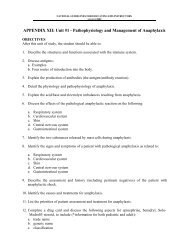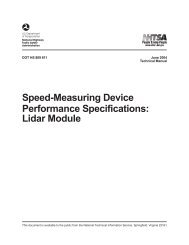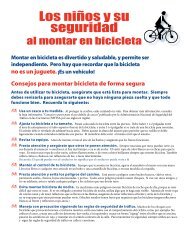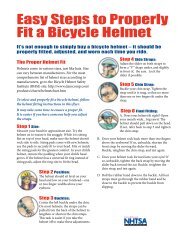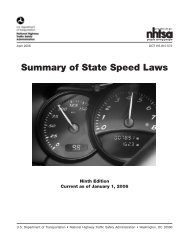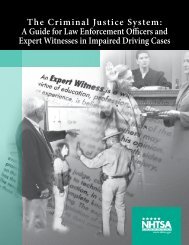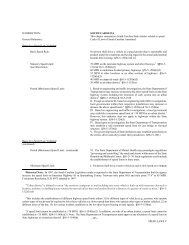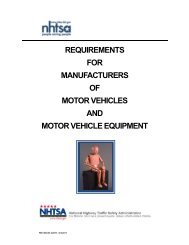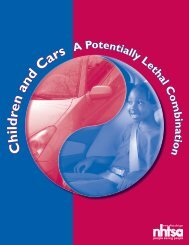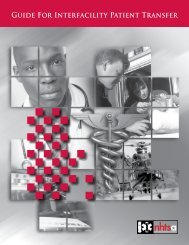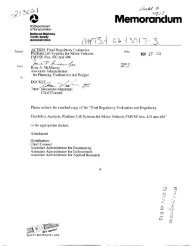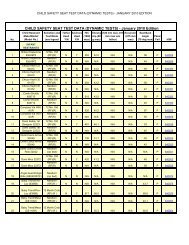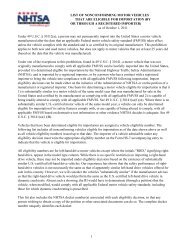Standard Practice for Emergency Medical Dispatch ... - NHTSA
Standard Practice for Emergency Medical Dispatch ... - NHTSA
Standard Practice for Emergency Medical Dispatch ... - NHTSA
Create successful ePaper yourself
Turn your PDF publications into a flip-book with our unique Google optimized e-Paper software.
11. Reciprocal Certification<br />
1. Reciprocal certification shall be established between certifying agencies<br />
and organizations having programs that meet the requirements<br />
contained in this practice and <strong>Practice</strong> F 1552.<br />
2. The diversified EMDPRS protocols require specific training and<br />
knowledge in their proper use, there<strong>for</strong>e, the emergency medical<br />
dispatcher wishing reciprocal certification must receive <strong>for</strong>mal training<br />
on the specific EMDPRS that is used <strong>for</strong> the certification being sought<br />
and as used within the employing emergency medical dispatch agency.<br />
12. Revocation of Certification<br />
1. The goal of quality assurance is to correct deficiencies and encourage<br />
excellence, not just adhere to minimum standards. Demonstrated<br />
inabilities and failure to per<strong>for</strong>m appropriate patient care through<br />
approved pre-arrival instructions and demonstrated inabilities and<br />
failure to per<strong>for</strong>m according to the predetermined medically approved<br />
protocols are significant failures and cannot be tolerated within a<br />
comprehensive EMD program.<br />
2. EMD certification or recertification may be suspended or revoked by<br />
the certifying entity <strong>for</strong> any of the following causes:<br />
1. Habitual or excessive use or addiction to narcotics or dangerous drugs,<br />
or conviction of any offense relating to the use, sale, possession, or<br />
transportation of narcotics, dangerous drugs, or controlled substances.<br />
2. Habitual or excessive use of alcoholic beverages or being under the<br />
influence of alcoholic beverages or controlled substances while on call<br />
or on duty as an EMD or conviction of driving under the influence of<br />
alcohol or controlled substances while driving a vehicle.<br />
3. Fraud or deceit in applying <strong>for</strong> or obtaining any certification, or fraud,<br />
deceit, incompetence, patient abuse, theft, or dishonesty in the<br />
per<strong>for</strong>mance of duties and practice as an EMD or other EMS<br />
professional.<br />
4. Involvement in the unauthorized use or removal of narcotics, drugs,<br />
supplies or equipment from any emergency vehicle, agency, or health<br />
care facility.<br />
5. Per<strong>for</strong>ming procedures or skills beyond the level of certification or not<br />
allowed by rules, or violation of laws pertaining to medical practice and<br />
drugs.<br />
6. Conviction of a felony or a crime involving moral turpitude, or the<br />
entering of a plea of guilty or the finding of guilt by a jury or court, of<br />
commission of a felony, or a crime involving moral turpitude.<br />
7. Mental incompetence as determined by a court of competent<br />
jurisdiction.<br />
8. For good cause, including conduct that is unethical, immoral, or<br />
dishonorable.<br />
9. In addition, recommendation <strong>for</strong> decertification or termination should<br />
also be based on the following:<br />
1. Demonstrated inabilities and failure to per<strong>for</strong>m appropriate patient<br />
care through approved pre-arrival instructions, and<br />
2. Demonstrated inabilities and failure to per<strong>for</strong>m according to the<br />
predetermined medically approved EMDPRS protocols.<br />
69



